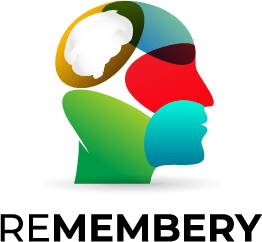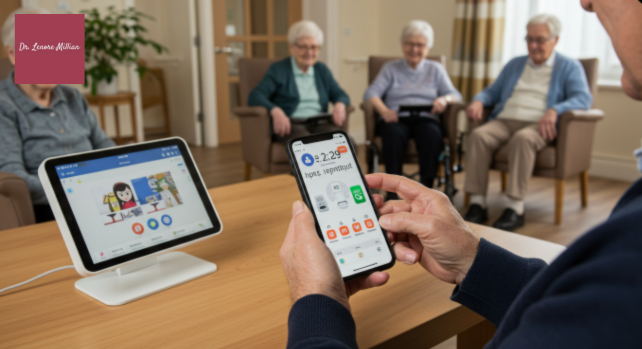Dementia is a complex condition that affects millions of elderly people worldwide, impacting their ability to remember, think clearly, and carry out daily tasks. As caregivers strive to provide support, the need for assistive technology has grown. With advancements in digital tools, people caring for elderly loved ones have new ways to make daily living easier and improve quality of life. One such solution is the Remembery App, a reminder app designed specifically to help manage the challenges of dementia. This blog will explore how assistive technologies, like the Remembery App, can play a crucial role in helping those with dementia and their caregivers.
The 4 Main Types of Dementia
Understanding the 4 main types of dementia is crucial for providing effective care. Each type comes with unique symptoms, yet they all share the common challenges of memory loss and forgetfulness, impacting daily life. Recognizing the type of dementia can guide appropriate care and treatment strategies for those affected.
1. Alzheimer’s Disease
Alzheimer’s disease is the most common form of dementia, leading to progressive memory loss and forgetfulness. In its early stages, individuals may experience mild confusion, such as forgetting appointments or names. As the disease progresses, memory loss becomes more severe, significantly affecting daily activities and cognitive functions.
2. Vascular Dementia
Vascular dementia results from impaired blood flow to the brain, often due to a stroke or similar events. It causes memory loss, forgetfulness, and problems with planning or decision-making. The progression of the disease can be sudden, with cognitive declines occurring in stages, typically following each vascular event.
3. Lewy Body Dementia
Lewy body dementia is characterized by abnormal protein deposits called Lewy bodies in the brain. These deposits disrupt cognitive function, causing memory loss, forgetfulness, and motor symptoms such as tremors or rigidity. The condition can mimic Alzheimer’s and Parkinson’s, making it difficult to diagnose, and treatment addresses both cognitive and physical symptoms.
4. Frontotemporal Dementia
Frontotemporal dementia (FTD) affects the frontal and temporal lobes, leading to personality, behavior, and language changes. Unlike Alzheimer’s, FTD typically begins with behavior changes, including impulsivity or poor judgment, and memory loss. As the disease progresses, individuals face difficulties with communication and executive functions, severely impacting daily life.
How Technology Can Support Dementia Care
Assistive technologies, like the Remembery App, offer a variety of features that support both those living with dementia and the people caring for elderly family members. These apps can be particularly beneficial for providing structure and routine, which are essential for dementia patients.
Reminder Apps are one of the most effective tools for managing memory loss. The Remembery App includes Daily Reminders that help individuals remember essential tasks throughout the day, from taking medications to attending appointments. These reminders can be set to trigger at specific times or intervals, offering flexibility to caregivers. By setting these reminders, caregivers can help individuals with dementia stay on top of daily routines and tasks, which improves their overall sense of independence and dignity.
Memory Loss and Forgetfulness in Seniors
One of the hallmarks of memory loss in seniors is forgetfulness, which is often one of the first signs of dementia. It can be particularly challenging for both patients and caregivers. Dementia is a progressive condition, which means symptoms worsen over time, making it difficult to manage day-to-day tasks as the stages of dementia progress.
As caregivers observe what are the stages of dementia, they may notice that simple tasks become increasingly difficult for their loved one. This is where dementia-friendly environments and technologies like the Remembery App come into play. With reminders for everyday activities, the app ensures that elderly individuals are not overwhelmed by the challenges posed by forgetfulness.
Creating a Dementia-Friendly Environment
Creating a dementia-friendly environment is not just about physical space but also about integrating technology that can aid in daily living. The Remembery App fits into this environment by offering tools that help elderly individuals stay organized and independent. For example, caregivers can set reminders for personal hygiene tasks, meal times, and even social activities. By reinforcing these reminders with positive reinforcement, individuals with dementia can feel more in control and less anxious about their routine.
In addition to helping with physical reminders, assistive technologies often have features designed to provide emotional support. In the case of the Remembery App, it offers a user-friendly interface that elderly people can easily navigate. Simple, clear prompts reduce confusion and provide a sense of security, knowing that assistance is just a click away.
Treatment and Support for Dementia Patients
While dementia treatment varies based on the type and stage of the disease, assistive technology like the Remembery App can serve as a complementary solution. Treatment often focuses on managing symptoms and maintaining cognitive function for as long as possible. Apps that provide reminders for medication schedules, doctor’s appointments, and other important activities can support the overall treatment plan. For example, if an individual forgets to take their medication, the app will send a notification, reducing the risk of missed doses and helping maintain health and stability.
Why Memory Loss Happens
Understanding what causes memory loss and forgetfulness is essential in dementia care. In most types of dementia, changes in the brain affect how information is processed and stored. These changes can cause confusion, memory loss, and behavioral issues. While these changes are often inevitable with aging, memory loss in seniors can be managed to some extent with the right support and technologies.
Assistive apps like Remembery are designed to bridge the gap between the cognitive decline of dementia and the needs of the individual. They offer solutions that enhance memory recall, provide gentle reminders, and create a consistent routine, all of which contribute to a more stable and predictable environment for those with dementia.
Benefits of Technology for Dementia Care
The integration of assistive technology into dementia care brings multiple benefits for both patients and caregivers. Some of these benefits include:
- Improved Independence: By using reminder apps, elderly individuals can manage simple tasks without relying heavily on others.
- Reduced Stress for Caregivers: With technology handling reminders, caregivers can focus on providing emotional support and physical assistance when needed.
- Better Medication Management: Apps like Remembery can send reminders for medication, reducing the likelihood of missed doses.
- Enhanced Safety: Reminder apps help prevent dangerous situations, such as forgetting to turn off a stove or lock the door.
Conclusion
Caring for elderly loved ones with dementia is a challenging yet deeply rewarding responsibility. By incorporating assistive technologies like the Remembery App, caregivers can help elderly individuals maintain their independence, reduce stress, and create a dementia-friendly environment. The ability to set Daily Reminders for essential tasks ensures that important activities are not overlooked, helping to alleviate memory loss and forgetfulness that are common in seniors. As we continue to witness advancements in technology, these tools offer new hope for those living with dementia, making the journey more manageable and less isolating for both individuals and caregivers.



